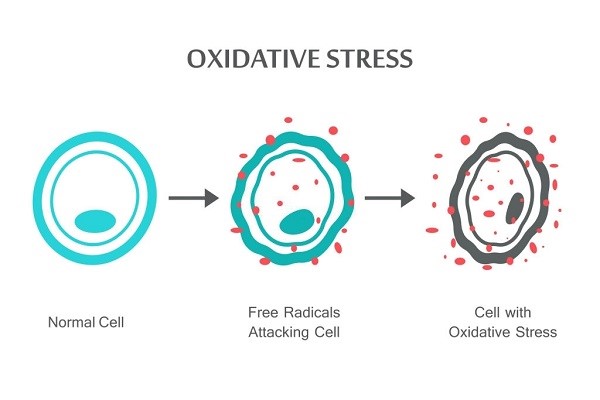Everything You Should Know About Oxidative Stress
Medically reviewed by Timothy J. Legg, PhD, PsyD, CRNP, ACRN, CPH — Written by Megan Dix, RN, BSN — Updated on September 28, 2018.
OVERVIEW
Oxidative stress is an imbalance between free radicals and antioxidants in your body. Free radicals are oxygen-containing molecules with an uneven number of electrons. The uneven number allows them to easily react with other molecules. Free radicals can cause large chain chemical reactions in your body because they react so easily with other molecules. These reactions are called oxidation. They can be beneficial or harmful.
Antioxidants are molecules that can donate an electron to a free radical without making themselves unstable. This causes the free radical to stabilize and become less reactive.
Read on to learn how oxidative stress affects the body and how to manage and prevent this imbalance.

EFFECTS OF OXIDATIVE STRESS ON THE BODY
Oxidation is a normal and necessary process that takes place in your body. Oxidative stress, on the other hand, occurs when there’s an imbalance between free radical activity and antioxidant activity. When functioning properly, free radicals can help fight off pathogens. Pathogens lead to infections.
When there are more free radicals present than can be kept in balance by antioxidants, the free radicals can start doing damage to fatty tissue, DNA, and proteins in your body. Proteins, lipids, and DNA make up a large part of your body, so that damage can lead to a vast number of diseases over time. These include:
- Diabetes
- Atherosclerosis, or the hardening of the blood vessels
- Inflammatory conditions
- High blood pressure, which is also known as hypertension
- Heart disease
- Cancer
- Oxidative stress also contributes to aging
- Neurodegenerative diseases, such as Parkinson’s and Alzheimer’s
WHAT ARE THE RISK FACTORS?
Everyone produces some free radicals naturally in their body through processes like exercise or inflammation. This is normal and part of the body’s intricate system of keeping itself healthy.
You may also be exposed to free radicals in the environment. Some sources include:
- Ozone
- Certain pesticides and cleaners.
- Cigarette smoke
- Radiation
- Pollution
- A diet high in sugar, fat, and alcohol may also contribute to free radical production
MANAGING AND PREVENTING OXIDATIVE STRESS
It’s impossible to completely avoid free radical exposure and oxidative stress. However, there are things you can do to minimize the effects of oxidative stress on your body. The main thing you can do is to increase your levels of antioxidants and decrease your formation of free radicals.
One method of preventing oxidative stress is to ensure that you’re obtaining enough antioxidants in your diet. Eating five servings per day of a variety of fruits and vegetables is the best way to provide your body what it needs to produce antioxidants. Examples of fruits and vegetables include:
- Berries
- Cherries
- Citrus fruits
- Prunes
- Dark leafy greens.
- Broccoli
- Carrots
- Tomatoes
- Olives
Other examples of dietary antioxidant sources include
- Fish and nuts
- Vitamin E
- Vitamin C
- Turmeric
- Green tea
- Melatonin
- Onion
- Garlic
- Cinnamon
Other healthy lifestyle choices can also prevent or reduce oxidative stress. Here are some lifestyle choices that will help:
A regular, moderate exercise routine. This has been associated with higher natural antioxidant levels and decreased damage caused by oxidative stress. Regular exercise has been with a longer lifespan, fewer effects of aging, and decreased risk of cancer and disease.
Don’t smoke. Avoid exposure to secondhand smoke as well.
Use caution with chemicals. This includes cleaning chemicals, avoiding unnecessary radiation exposure, and being aware of other sources of chemical exposure, such as pesticides used on food or in gardening.
Be environmentally conscious. Environmentally friendly initiatives like carpooling help reduce free radical production for you and your community.
Wear sunscreen. Sunscreen prevents ultraviolet light damage to your skin.
Decrease your alcohol intake.
Get plenty of sleep. Ample sleep is very important for maintaining balance in all of your body systems. Brain function, hormone production, antioxidant and free radical balance, and a host of other things are impacted by sleep.
Avoid overeating. Studies have shown that overeating and constant eating keep your body in a state of oxidative stress more often than if you eat at appropriately spaced intervals, and eat small or moderate portions.
Supplement dietary: Low-dose supplements, such as multivitamins, minerals and….herbs to support antioxidant: Ginkgo biloba, Bluberry, Panax Ginseng,… may be beneficial if you are deficient in certain nutrients or unable to follow a healthy diet.
THE TAKEAWAY
While free radicals and antioxidants are part of your body’s natural and healthy functioning, oxidative stress occurs when free radicals and antioxidants are out of balance. Oxidative stress can cause damage to many of your tissues, which can lead to a number of diseases over time.
While you can’t completely avoid exposure to free radicals, you can make lifestyle choices regarding diet, exercise, and environment to help keep your body in balance, and prevent damage and disease.
Sources: Healthline
https://www.healthline.com/health/oxidative-stress#takeaway
https://www.healthline.com/nutrition/antioxidants-explained#supplements
References
Betteridge DJ. (2000). What is oxidative dtress? ncbi.nlm.nih.gov/pubmed/10693912
Maritim AC, et al. (2003). Diabetes, oxidative stress, and antioxidants: A review. DOI:10.1002/jbt.10058
Osawa T, et al. (2005). Protective role of antioxidative food factors in oxidative stress caused by hyperglycemia. DOI: 10.1196/annals.1333.050
Physical activity and health. (2015). cdc.gov/physicalactivity/basics/pa-health/index.htm
Poljsak B. (2011). Strategies for reducing or preventing the generation of oxidative stress.DOI: 10.1155/2011/194586
Sies H. (2015) Oxidative Stress: a concept in redox biology and medicine. DOI: 10.1016/j.redox.2015.01.002
Yoshikawa T, et al. (2002). What is oxidative stress? med.or.jp/english/pdf/2002_07/271_276.pdf
- 1. THE EXPERT’S SHARING: THE KEY TO START A NEW DAY FULL OF ENERGY
- 2. GINSENG – “SPECIAL” HERBAL MEDICINE FOR FATIGUE PEOPLE
- 3. THE ROLE OF HERBAL IN INCREASING PHYSICAL & MENTAL HEALTH
- 4. TIPS FOR CHOOSING AUTHENTIC AND HIGH QUALITY CORDYCEPS SUPPLEMENTS
- 5. LIST OF 3 EFFECTIVE BRAIN SUPPLEMENT HERBALS
- 6. FATIGUE – WARNING SIGNS OF CHRONIC FATIGUE SYNDROM, YOU SHOULD KNOW?

